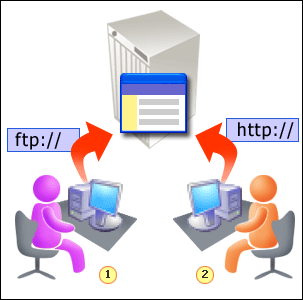Computer Networks Questions & Answers – HTTP &
FTP
1. Multiple object can be sent over
a TCP connection between client and server in
a) persistent HTTP
b) nonpersistent HTTP
c) both persistent HTTP and nonpersistent HTTP
d) none of the mentioned
a) persistent HTTP
b) nonpersistent HTTP
c) both persistent HTTP and nonpersistent HTTP
d) none of the mentioned
Answer: a
Explanation: None.
Explanation: None.
2. HTTP is ________ protocol.
a) application layer
b) transport layer
c) network layer
d) none of the mentioned
a) application layer
b) transport layer
c) network layer
d) none of the mentioned
Answer: a
Explanation: None.
Explanation: None.
3. In the network HTTP resources are
located by
a) uniform resource identifier
b) unique resource locator
c) unique resource identifier
d) none of the mentioned
a) uniform resource identifier
b) unique resource locator
c) unique resource identifier
d) none of the mentioned
Answer: a
Explanation: None.
Explanation: None.
4. HTTP client requests by
establishing a __________ connection to a particular port on the server.
a) user datagram protocol
b) transmission control protocol
c) broader gateway protocol
d) none of the mentioned
a) user datagram protocol
b) transmission control protocol
c) broader gateway protocol
d) none of the mentioned
Answer: b
Explanation: None.
Explanation: None.
5. In HTTP pipelining
a) multiple HTTP requests are sent on a single TCP connection without waiting for the corresponding responses
b) multiple HTTP requests can not be sent on a single TCP connection
c) multiple HTTP requests are sent in a queue on a single TCP connection
d) none of the mentioned
a) multiple HTTP requests are sent on a single TCP connection without waiting for the corresponding responses
b) multiple HTTP requests can not be sent on a single TCP connection
c) multiple HTTP requests are sent in a queue on a single TCP connection
d) none of the mentioned
Answer: a
Explanation: None.
Explanation: None.
6. FTP server listens for connection
on port number
a) 20
b) 21
c) 22
d) 23
a) 20
b) 21
c) 22
d) 23
Answer: b
Explanation: None.
Explanation: None.
7. In FTP protocol, client contacts
server using ____ as the transport protocol.
a) transmission control protocol
b) user datagram protocol
c) datagram congestion control protocol
d) stream control transmission protocol
a) transmission control protocol
b) user datagram protocol
c) datagram congestion control protocol
d) stream control transmission protocol
Answer: a
Explanation: None.
Explanation: None.
8. In which mode FTP, the client initiates
both the control and data connections.
a) active mode
b) passive mode
c) both active mode and passive mode
d) none of the mentioned
a) active mode
b) passive mode
c) both active mode and passive mode
d) none of the mentioned
Answer: b
Explanation: None.
Explanation: None.
9. The file transfer protocol is
built on
a) data centric architecture
b) service oriented architecture
c) client server architecture
d) none of the mentioned
a) data centric architecture
b) service oriented architecture
c) client server architecture
d) none of the mentioned
Answer: c
Explanation: None.
Explanation: None.
10. In file transfer protocol, data
transfer can be done in
a) stream mode
b) block mode
c) compressed mode
d) all of the mentioned
a) stream mode
b) block mode
c) compressed mode
d) all of the mentioned





ليست هناك تعليقات:
إرسال تعليق